
Excellencies, Ladies and Gentlemen,
It is an honor to be here at the 36th Session of the FAO Committee on Fisheries.
The strategic partnership between the WTO and the FAO is so crucial to address the significant challenges facing fisheries and agriculture worldwide. It is impossible to solve the global problems of food systems without trade. A predictable and well-functioning trading system is essential to providing adequate nutrition to populations worldwide.
Today, I’d like to issue a call to action on a topic that is well-known to you and that has been front and center in Geneva.
The sustainability of fisheries is a growing emergency for nations worldwide as the deterioration of fish stocks accelerates unabated.
Many millions of people worldwide depend on marine fishing for income, food security, and livelihood. Sustainable management of our ocean resources is therefore essential for our future. To that end, donors globally have stepped up through development assistance. WTO analysis shows that a total of USD 4.5 billion in support of marine fisheries was disbursed over the 13-year period of ending in 2022, of which 59% targeted sustainable fisheries. However, and this bears highlighting — these disbursements of USD 346 million per year are overwhelmed by the estimated USD 22 billion provided annually in harmful fisheries subsidies — by a factor of 63. What a game changer it would be for the ocean and fish stocks if we turned harmful fisheries subsidies into support for sustainable fisheries.
The WTO Agreement on Fisheries Subsidies concluded at the 12th WTO Ministerial Conference in 2022 marks a key milestone in achieving this goal. This historic deal prohibits the most harmful subsidies affecting the sustainability of global fisheries, namely those to illegal, unreported, and unregulated (IUU) fishing, those concerning overfished stocks, and those to fishing in the unregulated high seas.
However, as you know, our work is not complete.
Two critical tasks remain, and we need to tackle them urgently.
First, the benefits of the Agreement will be realized only when it enters into force. For this to happen, 2/3 of the WTO Membership — or 110 Members — must accept the Agreement by depositing their national instruments of ratification in Geneva. While 78 Members have done so, we still need 32 more. We aim hit the required number by the end of the year.
Excellencies, I appeal to you for your support in bringing the Agreement into force this year. To those of you who have not deposited, I urge you most earnestly to take this important step promptly. Please mobilize your governments and your legislatures to this end. I know that many of you already have your domestic processes well underway, and I very much appreciate your efforts. We stand ready to support you.
Now, the WTO membership is aware of the challenges in implementing the Agreement once it enters into force. That is why Article 7 of the Agreement provides that a financing mechanism (known as “Fish Fund”) will be established to support developing and least-developed WTO Members in implementation. The FAO, together with the World Bank, IFAD, and the WTO, are key partners of the Fish Fund. Thanks to the generosity of donors, we already have $12 million on hand, with another $2 million pledged, to support WTO Members who need assistance once the Agreement enters into force, if they have deposited their domestic ratifications.
The second pressing issue is the completion of the ongoing second wave of negotiations, aimed at subsidies contributing to overcapacity and overfishing. The goal is to achieve a balanced agreement, with ambitious disciplines on these harmful subsidies as well as appropriate and effective special and differential treatment for developing Members, particularly to support artisanal and livelihood fishing.
We came so very close to concluding this work at 13th WTO Ministerial Conference in Abu Dhabi a few months ago.
Many WTO Members are very eager to bring this across the finish line. A diverse group of Members recently issued a statement in support of concluding these negotiations by the end of this month. Ambassador Gunnarsson of Iceland, who chairs the negotiations, conveyed to Members the overwhelming collective will to finalize Fish 2 by our upcoming General Council meeting in July, although he has noted that some are still skeptical. Work is progressing vigorously in Geneva, and we count on your continued active and constructive participation to achieve this objective.
Excellencies, we have an opportunity and a responsibility to save the fish, and the millions — even billions — who depend on them for food and livelihood. We have two action items for which we need your leadership: entry into force of Fish 1, and the conclusion of a balanced Fish 2. It’s all in your hands.
Thank you.
Share
Reach us to explore global export and import deals